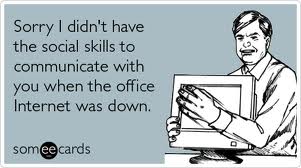Four Common Myths About Social Skills
Author: Laurie Wilhelm
Many people misunderstand what social skills are – and what they’re not. Here’s a quick look at a few common myths and some information on what social skills really are.
Myth #1:
People who like talking are interesting and have good social skills.
False.
Verbosity isn’t a social skill. In fact, it can damage one’s social popularity and result in avoidance by others. Such over-talkative individuals may be seen as:
– self-centered: most of their monologue is about themselves, their opinions, their activities, etc.
– rude: they monopolize the conversation without letting others contribute or participate
– selfish: their incessant talk shows little respect for the listener’s time and interests
– boring: loquacious individuals tend to include too much trivial information that is irrelevant and uninteresting to the listener.
The number of words spoken does not necessarily reflect good-quality conversation nor an ability to effectively interact with others. People are interesting when they have something worthwhile to say and are able to engage in a discussion. Good social skills include the ability to carry on a conversation without dominating it and to encourage others to participate.
Myth #2:
Introverts are socially unskilled individuals.
False.
The elements of good social skills are the same for everyone. Both introverts and extroverts alike can have superb social skills or, alternatively, very poor social skills. Skills such as listening, conversing, remembering names, showing common courtesies, and giving good feedback require attentiveness from anyone who displays good social skills, regardless of whether they’re an introvert or an extrovert. A lack of such attentiveness shows a general lack of social skills.
Introverts who have refined their interpersonal skills have techniques to follow when in social situations, and those who continue to improve their professional and personal relationships are highly socially skilled.
Myth #3:
A good education and hard work are all anyone needs to succeed in a career and in life. Good social skills aren’t important.
False.
A solid education and work or personal experience are undoubtedly key factors that contribute to success. Knowing how to perform a job function, managing the tactics of a plan or having technical knowledge of machinery or equipment qualifies the individual for the position.
However, as the individual progresses in her career and life, the manner in which she interacts with others – and the quality of that interaction – plays an important role in determining the degree of success she attains. There are always others who have input and an impact on the ease or difficulty she will face when seeking career advancement and development.
Those with highly developed social skills understand the importance and value of their relationships. They realize that while having the appropriate education or experience is essential, social skills are paramount when seeking ongoing career opportunities.
Myth #4:
People with poor social skills are aloof, uncaring and indifferent.
False.
Individuals who have poor social skills may, in fact, be caring and interested. It’s unfortunate that their lack of social skills results in them being misunderstood and negatively labelled. The misrepresentation that these individuals incur is caused by their inability to know what to say and how to act or behave in social situations. Often, they lack the necessary skills to effectively express themselves and communicate in ways that show support, encouragement and friendliness.
To be understood as the person they truly are, and to avoid being mistaken for someone they’re not, they need to acquire good social skills that allow others to recognize their positive attributes. These individuals simply need assistance and guidance to know what to do and how to interact effectively in social situations. There are many methods and techniques that can help individuals learn these simple skills and easily implement them in everyday life.
What are Social Skills?
Social skills are a collection of verbal communication techniques and non-verbal actions that we use to interact and connect with others.
Strong social skills include (among others):
– active listening
– knowing how to greet others
– conversing and making small talk
– building a friendly rapport
– complimenting others
– offering praise and encouragement
– showing support and understanding
– acknowledging others
– saying ‘thank you’
Social skills can be learned by anyone and most skills are easy to integrate into daily life. Sometimes all it takes is to be aware of an action, such as saying ‘thank you’ or remembering someone’s name. Other times it’s breaking a poor habit, like interrupting someone when they’re speaking. Then there are some social skills that involve learning new techniques, such as giving constructive feedback and making small talk.
Good social skills are key to establishing, maintaining and growing all relationships – at work, at home and in the community.
Article Source: http://www.articlesbase.com/self-improvement-articles/four-common-myths-about-social-skills-445418.html
About the Author
Laurie Wilhelm manages the Express Yourself to Success website, a one-stop e-source with information and techniques on interpersonal and social skills, public speaking, networking and conflict resolution. Achieve your success by working effectively with others. Find out how you can boost your career and get a free white paper, What Everyone Needs to Know About Social Skills, by going to www.expressyourselftosuccess.com.








